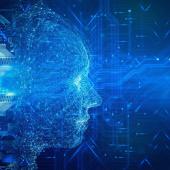Computers are amazing machines, but they’ll never beat the checkers world champion. They will never match the skill of a chess Grandmaster. And they certainly will never understand complex human speech and defeat the reigning Jeopardy champion.
Of course, that was all true until 1990 (checkers), 1997 (chess), and 2011 (Jeopardy). When it comes to contests of intellect and strategic planning, computers now easily defeat all human opponents, regardless of their skill.
For Luddites, this is a worrying timeline. They see it as another example of computers taking over the world, eventually enslaving all humans in their creation of a silicon master race.
It used to be that computers were thought of as merely brute-force data processing machines. They could churn through piles of information, but they could not identify patterns, learn from mistakes, or “think” creatively. We comfortably assumed that computers would never match the nuance and nimbleness of the human brain.
But today, computers are learning, they are identifying patterns, and they are “thinking” creatively. We live in the early days of silicon-based cognition, and the chasm between the human brain and microprocessors has narrowed.
In other words, human beings no longer dominate the world of “tacit knowledge.”
The concept of tacit knowledge was popularized by the Hungarian scientist Michael Polanyi in 1958. He observed that human beings understand more than they can explain. To Polanyi, a skill that cannot be transcribed into words and taught — like riding a bicycle, driving a car, or understanding complex language — is tacit knowledge. And the phenomenon in which certain abilities cannot be transferred through words is known as “Polanyi’s Paradox.”
Tacit knowledge was once an insurmountable challenge to software engineers. If you cannot express a process in writing — and transcribe it into code — a computer cannot use it. Computers, it was thought, would never use tacit knowledge. They would never match the skills of a human professional in any field.
But if you still hope that Polanyi’s Paradox will forever hinder silicon cognition, the most recent evidence is unsettling. Modern, high-powered computers, using the techniques of “deep learning,” are able to identify patterns and react to new facts based on past experience. New software does not prescribe a certain outcome from specific data, outcomes that had to be anticipated by a human being. Instead, these new programming techniques create an output based on pattern recognition as well as lots of trial and error.
In other words, computers are learning and creating. These computers are merely toddlers right now, maybe even just newborn infants, but they can actually “learn.” Eventually these infants will absorb enough information to become irreverent youths and young adults. Someday, it is theoretically possible for a computer to compose beautiful music, create fine art, or even draft a legal brief.
The barrier of tacit knowledge in computers, it seems, is not a barrier at all. But will robot “lawyers” soon take all our jobs?
But before you channel Ted Kaczynski and move to a hovel in the woods, consider what your job entails. You are not a Grandmaster in chess or a Jeopardy whiz, but to a computer your everyday existence is far more complex. You are not just preparing for a single competition, but synthesizing dozens of different “games” simultaneously. As a lawyer, you are collecting facts and looking for patterns that match past experience, but you are also considering unspoken human emotions, hidden agendas, and biased listeners. As a lawyer, you are contemplating not just the words in a contract, but how fallible human beings will interpret and enforce that contract.
If there was a job that entailed multiple levels of tacit knowledge, being a lawyer is near the top of the list. That’s probably why many law schools spend surprisingly little time on statutes and more on how to “think” like a lawyer. The goal is to teach the unteachable, and enable law students to naturally develop the tacit knowledge of being a great lawyer.
Will a computer ever defeat the world’s greatest trial lawyer in court? Maybe someday, but not anytime soon. The magic of tacit knowledge remains our legal advantage.




